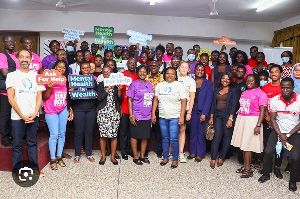Policy think tank, IMANI Africa, is calling for urgent auditing of the accounts of the Electoral Commission of Ghana (EC), citing escalations in its expenditure on the electoral process.
According to the Founding President and Chief Executive Officer of IMANI Africa, Franklin Cudjoe, the EC’s expenditure on voting infrastructure, for instance, has been increasing astronomically over the last decade as improved technology is being introduced.
For Imani, the massive expenditure and concerns raised by the Auditor General in his 2013 to 2018 audit report call for urgent auditing of the staggering expenditure of the EC over the years to establish whether or not there was wrongdoing or mismanagement.
“…Recent audits by the Auditor-General in the period between 2015 and 2018 have flagged serious problems with the integrity of the EC’s asset management and the quality of its asset registers, systems seriously critical to safeguarding and conserving this country’s meagre financial resources whilst ensuring the sound discharge of the EC’s mandate.
In the midst of these lingering concerns about the quality of the EC’s asset management practices, the EC has stoked controversy with an announcement that it intends to discard the entirety of its current biometric voter management system, and has indeed begun awarding contracts to procure a brand new system (BVMS) at a potential cost in excess of $80 million.
… We are of the carefully researched view that such expenditure warrants an urgent audit of past expenditures to ensure that these cost escalations are not driven by maladministration of assets, negligence, or much worse, malfeasance,” Mr Cudjoe proposed on social media.
The EC is set to compile a new voters’ register this year despite widespread opposition to move especially by opposition parties and some civil society organisations.
However the EC insists that the new register is a necessity to ensure the sanctity of the 2020 general elections…
Full post by Franklin Cudjoe
On voter register- part of IMANI’s concerns revisited again.
1. Concerns about the integrity of the electoral process, and particularly the security of voting mechanisms, have necessitated considerable investments running into tens of millions of dollars for the rollout of technological infrastructure.
2. At the core of this infrastructure is a set of technology tools which has collectively come to be known as the Biometric Voters Management System (BVMS), comprising, in the main, of biometric voter registration machines (BVRs), biometric verification devices (BVDs), automatic biometric identification software (ABIS), very small aperture terminals (VSATs), Voter Management System software and hardware (VMS) and datacentre equipment.
3. In the last decade and half alone, Ghana has incurred expenditure in excess of $200 million on this platform, its precursors and ancillary systems. An amount well beyond what we have spent on similarly critical aspects of national life, such as storm drainages, public health research and climate change mitigation.
4. Indeed, spending on the electoral process was US$138 million in 2008, and $267 million in 2012. Four years later, an almost identical figure of $269 million was spent on the election. Between 2012 and 2016 major procurements were made for the purposes of acquiring specialized tools to verify the identity of voters, as well as handle and manage the data of the ever-growing number of voters.
5. Recent audits by the Auditor-General in the period between 2015 and 2018 have flagged serious problems with the integrity of the EC’s asset management and the quality of its asset registers, systems seriously critical to safeguarding and conserving this country’s meagre financial resources whilst ensuring the sound discharge of the EC’s mandate.
6. In the midst of these lingering concerns about the quality of the EC’s asset management practices, the EC has stoked controversy with an announcement that it intends to discard the entirety of its current biometric voter management system, and has indeed begun awarding contracts to procure a brand new system (BVMS) at a potential cost in excess of $80 million.
7. We are of the carefully researched view that such expenditure warrants an urgent audit of past expenditures to ensure that these cost escalations are not driven by maladministration of assets, negligence, or much worse, malfeasance.
8. The EC insists that new gadgets, many procured within the last 4 years, according to audits conducted by the Auditor-General and Ministry of Finance records, have suddenly become obsolete, despite the limited use to which such devices have been intermittently applied over the period
General News of Saturday, 16 May 2020
Source: mynewsgh.com

















